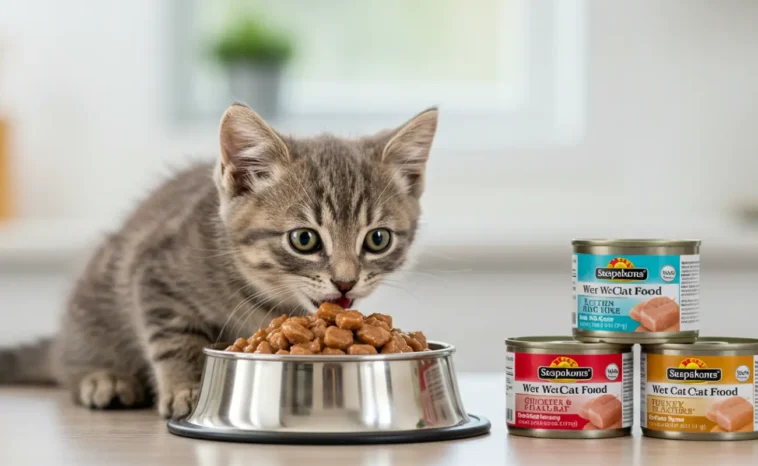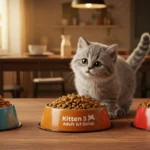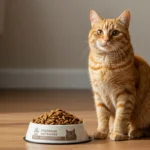Choosing the best wet cat food for kittens is crucial for their growth, energy, and overall health. Kittens require a nutrient-dense diet that supports their rapid development, strong bones, and a shiny coat. But with so many options available, how do you know which one is right for your little feline friend?
In this guide, we will explore the best wet kitten food options, discuss what makes a high-quality kitten food, and provide tips on how to feed your kitten properly. Whether you’re a first-time kitten owner or an experienced cat parent, this article will help you make an informed decision.
Overview
Kittens require a more nutrient-dense diet than adult cats to support their rapid growth and development. Their food should be rich in protein, fat, and essential vitamins to support their fast growth. Unlike adult cats, kittens need more calories and nutrients to develop strong muscles, bones, and a healthy immune system.
Wet cat food is often recommended for kittens due to its high moisture content, which keeps them hydrated and helps with digestion. Additionally, the soft texture makes it easier for young kittens to chew and swallow.
Related Article: How to Transition Your Kitten to Adult Cat Food
What to Look for in the Best Wet Cat Food for Kittens
Not all wet cat foods are created equal. When selecting the best option for your kitten, consider the following factors:
1. High-Quality Protein
Protein is the foundation of a kitten’s diet. Look for wet foods that list real meat (such as chicken, turkey, beef, or fish) as the first ingredient. Choose wet cat food that prioritizes real meat and essential nutrients, avoiding unnecessary fillers like corn, wheat, or soy.
2. Essential Nutrients
Kittens need specific nutrients for proper development, including:
- Taurine (essential for heart and eye health)
- DHA (supports brain development)
- Calcium & Phosphorus (for strong bones and teeth)
- Omega-3 & Omega-6 fatty acids (for a healthy coat and skin)
3. Moisture Content
Wet food provides necessary hydration, which is vital for young kittens. A moisture content of at least 75% is ideal to keep them hydrated and support kidney health.
4. Grain-Free or Limited Grains
Some kittens have sensitive stomachs and do better with grain-free formulas. However, if grains are included, ensure they are whole and nutritious, such as brown rice or oatmeal.
5. No Artificial Additives
Avoid wet foods with artificial preservatives, colors, or flavors. Natural ingredients are always the best choice for a growing kitten.
Best Wet Cat Food for Kittens (Top Picks)
1. Royal Canin Mother & Babycat Wet Kitten Food
- Why it’s great: Specially formulated for kittens under four months old, this food contains highly digestible proteins and essential vitamins.
- Key Benefits:
- Contains DHA for brain development
- Soft mousse texture for easy chewing
- High moisture content to keep kittens hydrated
2. Blue Buffalo Wilderness Kitten Grain-Free Wet Cat Food
- Why it’s great: Made with real chicken as the first ingredient, this grain-free formula provides high protein and natural nutrients.
- Key Benefits:
- No by-products, artificial flavors, or preservatives
- High protein to support muscle development
- DHA and ARA for cognitive function
3. Wellness CORE Grain-Free Kitten Formula
- Why it’s great: This premium-quality kitten food is rich in real turkey and chicken, providing a well-balanced diet.
- Key Benefits:
- Rich in antioxidants and probiotics for digestion
- Omega fatty acids for skin and coat health
- No corn, wheat, or soy
4. Fancy Feast Kitten Canned Wet Food
- Why it’s great: A budget-friendly option that still provides high-quality ingredients and essential nutrients.
- Key Benefits:
- Soft texture for easy eating
- Fortified with vitamins and minerals
- Affordable and widely available
5. Hill’s Science Diet Kitten Wet Cat Food
- Why it’s great: Designed by veterinarians and made with natural ingredients to support growth.
- Key Benefits:
- Balanced nutrition for healthy growth
- No artificial flavors or preservatives
- High-quality protein for muscle development
Common Questions About Wet Cat Food for Kittens
1. How Often Should I Feed My Kitten Wet Food?
Kittens should be fed 3-4 small meals per day until they are about six months old. Once your kitten reaches six months of age, gradually reduce feeding frequency to two meals per day.
2. Can I Mix Wet and Dry Food for My Kitten?
Yes! Mixing wet and dry food can provide variety, improve hydration, and ensure balanced nutrition.
3. At What Age Should Kittens Switch to Adult Cat Food?
Most kittens are ready to transition to adult cat food by the time they reach 12 months of age. However, some larger breeds, like Maine Coons, may need kitten food for up to 18 months.
Tips for Feeding Your Kitten Wet Food
- Use a feeding schedule to maintain consistency.
- Slightly warming the food enhances its aroma, making it more enticing for picky kittens.
- Provide fresh water at all times, even if your kitten eats wet food.
- Monitor portion sizes to avoid overfeeding.
- Gradually introduce new foods to prevent digestive upset.
Challenges and Solutions in Choosing Kitten Food
1. Picky Eaters
Some kittens refuse to eat certain flavors or textures. If your kitten is picky, try different brands, flavors, or mixing in a bit of warm water.
2. Digestive Issues
If your kitten experiences diarrhea or vomiting, switch to a sensitive stomach formula and consult a vet.
3. Food Allergies
Watch for signs of allergies, such as itchy skin, excessive scratching, or vomiting. Try a limited-ingredient diet if needed.
Benefits of Feeding Wet Food to Kittens
- Hydration: Supports kidney and urinary health.
- Better Digestion: Easier to digest compared to dry food.
- High Protein: Helps build strong muscles and bones.
- Tasty & Appealing: More palatable for young kittens.
Expert Opinions on Wet Cat Food for Kittens
Veterinarians recommend wet food as a primary diet for kittens due to its high moisture content and superior nutritional profile. Dr. Emily Harper, a feline nutritionist, states, “Wet food provides essential hydration and proteins that kittens need for optimal growth and development.”
Conclusion & Call-to-Action
Selecting the best wet cat food for kittens ensures your furry friend grows into a healthy, active adult cat. Prioritize high-quality ingredients, protein-rich formulas, and essential nutrients to support their development.
Do you have a favorite wet kitten food that your kitten loves? Share your recommendations in the comments below!





